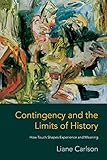Contingency and the Limits of History : How Touch Shapes Experience and Meaning / Liane Carlson.
Material type: TextPublisher: New York, NY : Columbia University Press, [2019]Copyright date: ©2018Description: 1 online resourceContent type:
TextPublisher: New York, NY : Columbia University Press, [2019]Copyright date: ©2018Description: 1 online resourceContent type: - 9780231190527
- 9780231548977
- 123 23
- BD595 .C36 2019
- online - DeGruyter
- Issued also in print.
| Item type | Current library | Call number | URL | Status | Notes | Barcode | |
|---|---|---|---|---|---|---|---|
 eBook
eBook
|
Biblioteca "Angelicum" Pont. Univ. S.Tommaso d'Aquino Nuvola online | online - DeGruyter (Browse shelf(Opens below)) | Online access | Not for loan (Accesso limitato) | Accesso per gli utenti autorizzati / Access for authorized users | (dgr)9780231548977 |
Browsing Biblioteca "Angelicum" Pont. Univ. S.Tommaso d'Aquino shelves, Shelving location: Nuvola online Close shelf browser (Hides shelf browser)

|

|

|

|

|

|

|
||
| online - DeGruyter Knowledge, Power, and Academic Freedom / | online - DeGruyter My Brilliant Friends : Our Lives in Feminism / | online - DeGruyter Indigenous Vanguards : Education, National Liberation, and the Limits of Modernism / | online - DeGruyter Contingency and the Limits of History : How Touch Shapes Experience and Meaning / | online - DeGruyter The Experience of Injustice : A Theory of Recognition / | online - DeGruyter Dying for Rights : Putting North Korea's Human Rights Abuses on the Record / | online - DeGruyter The Unworthy Scholar from Pingjiang : Republican-Era Martial Arts Fiction / |
Frontmatter -- Contents -- Acknowledgments -- Introduction -- 1. Illness -- 2. Loneliness -- 3. Violation -- 4. Love -- Conclusion -- Notes -- Bibliography -- Index
restricted access online access with authorization star
http://purl.org/coar/access_right/c_16ec
Central to the historicizing work of recent decades has been the concept of contingency, the realm of chance, change, and the unnecessary. Following Nietzsche and Foucault, genealogists have deployed contingency to show that all institutions and ideas could have been otherwise as a critique of the status quo. Yet scholars have spent very little time considering the genealogy of contingency itself-or what its history means for its role in politics.In Contingency and the Limits of History, Liane Carlson historicizes contingency by tying it to its theological and etymological roots in "touch," contending that much of its critical, disruptive power is specific to our current historical moment. She returns to an older definition of contingency found in Christian theology that understands it as the lot of mortal creatures, who suffer, feel, bleed, and change, in contrast to a necessary, unchanging, impassible God. Far from dying out, Carlson reveals, this theological past persists in continental philosophy, where thinkers such as Novalis, Schelling, Merleau-Ponty, and Serres have imagined contingency as a type of radical destabilization brought about by the body's collision with a changing world. Through studies of sickness, loneliness, violation and love, she shows that different experiences of contingency can lead to dramatically dissimilar ethical and political projects. A strikingly original reconsideration of one of continental philosophy and critical theory's most cherished concepts, this book reveals the limits of historicist accounts.
Issued also in print.
Mode of access: Internet via World Wide Web.
In English.
Description based on online resource; title from PDF title page (publisher's Web site, viewed 02. Mrz 2022)


